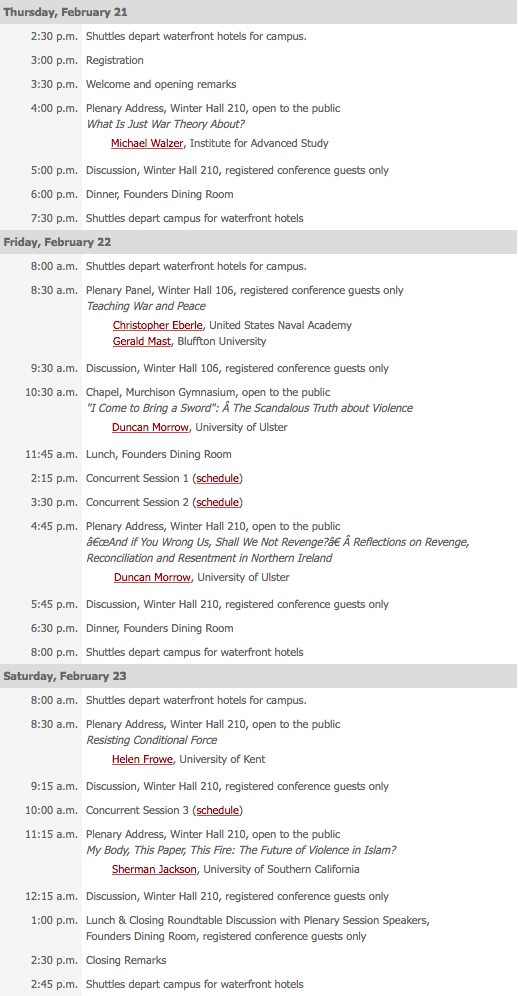War and peace are among the most critical issues a society faces—but also among the most complex. Nearly every academic discipline connects in important ways with these issues. To really understand them and address them adequately takes the kind of holistic approach offered by a liberal arts education.
We were privileged to have Michael Walzer as the lead catalyst for our conversations. No one has been more influential in Just War thinking in the past several decades, and as part philosopher, part political scientist and part historian, Professor Walzer embodies the interdisciplinarity so important in addressing war and peace well. The disciplines and backgrounds represented by our other outstanding speakers (Duncan Morrow, Helen Frowe, Sherman Jackson, Chris Eberle and Gerald Mast) further ensured the breadth of perspective so essential to these topics.
Of course our speakers were just the start. All of the Conversation's participants had important contributions to make. In the 40 or so papers presented at concurrent sessions, we learned from scholars in a variety of fields, but also from those involved in peacemaking efforts on the ground, and from those with insight into curricular structures and pedagogical strategies for effective teaching about war and peace.
2013 Conversation Planning Committee:
Christian Hoeckley-- director, Gaede Institute for the Liberal Arts
Jesse Covington-- assistant professor of political science
Deborah Dunn-- professor of communication studies
Heather Keaney-- associate professor of history
Tom Knecht-- associate professor of political science
Mark Nelson-- Monroe Professor of Philosophy
Concurrent Session 1: Friday, Feb 22 2:15
Panel 1:
Ashley Padgett
The Christian Influence on the Adjusted Perceptions of Chemical WeaponsStephen Contakes and Taylor Jashinsky
Chemistry, Social Responsibility and Modern Warfare
Panel 2:
Matthew Beard
Virtuous Soldiers: A Role for the Liberal Arts? (Abstract)Shannon French
Reducing Atrocities in Modern Combat Through Military Discipline and the Warrior’s Code of Honor
Panel 3:
David Hoekema
Following War in Uganda: Lessons from Kony 2012
Paula Cronovich
The "NO" Campaign in Chile: Paving a Peaceful Transition to Democracy
Panel 4:
Joe Cole
Human Sacrifice in Walzer's Just War Theory (Abstract)
Cheryl Abbate
Assuming the Risk: A Critical Analysis of a Soldier's Duty to Prevent Collateral Damage (Abstract)
Panel 5:
Gary Tandy
Contemplation, Preparation, and Action: Peace Pilgrim's Prophetic Witness for our Time (Abstract)Alden Stout
Pedagogy and Principled Thinking about War
Concurrent Session 2: Friday, Feb 22 3:30
Panel 1:
Jeffry Davis
Albert Camus' Response to a War-Torn World: the Embodiment of his Ethic in the Liberating Art of DramaMarilyn McEntyre
Speaking Peace: Finding Words that Breach Walls
Panel 2:
Hadassa Noorda
Travel Bans and Other Targeted Non-Physical Preventions of Terrorist Acts at the Interface of War and Peace (Abstract)
Daniel Brunstetter and Megan Braun
State of the Union: A Decade of Armed Drones (Abstract)
Panel 3:
Nathanael Smith
Bringing the Women Home: Rape, Civil Society, and Spirituality in the Democratic Republic of the Congo (Abstract)
Cian O'Driscoll
Stoned Immaculate: Western Conceptions of Victory in War (Abstract)Amit Ron
Peace Negotiations and Peace Talks: the Peace Process in the Public Sphere
Panel 4:
Clay Cooke
Investing in Justice: How a Liberal Arts Education Indirectly Promotes Peace (Abstract)Stephen Paul Kennedy
What Has Become of Humanity?
Panel 5:
David Western
A Humanistic Approach to Peace: the Liberal Art and Peacemaking; a Critique and a Proposition (Abstract)
Kevin Walker
Education in the "Strenuous Life" (Abstract)
Panel 6:
Brian Jones
YHWH is a Warrior
Brant Himes
The Common Good and Just Peacemaking: Abraham Kuyper's and Dietrich Bonhoeffer's Discipleship for a Better Worldliness (Abstract)
Concurrent Session 3: Saturday, Feb 23 10:00
Panel 1:
Robert Williams
Arts and Letters, War and Peace: What Poets and Painters Can Teach Us about International Politics (Abstract)Ron Hirschbein
International Crises: a Hermeneutic Approach (Abstract)
Panel 2:
Nolen Gertz
A New Approach to Military Professionalism: On the Need for 'Soldier-Artists'Michaeleen Kelly
Just War Theory as Ideological and Combatant Role Confusion
Panel 3:
Bryanna Beauchamp , Julianna Carlson, Emily Keach, Kathryn Hopper, Zoe Newcomb
Jus Ad Bellum as a Deciding Factor in the 1983 U.S. Invasion of Grenada
Chris Costenbader, Curtis Donahoe, David Dry, Joshua Miller, Steve Harvey
Just War, National Interests, and the Iraq War
Panel 4:
Judith Rood
A Shattered Order: The Apocalyptic Sublime and the Liberal Arts; an Interdisciplinary Approach to the Study of the Palestinian-Israeli Conflict
Khalil Dokhanchi and Karl Bahm
Teaching War and Peace in Bosnia (Abstract)
Panel 5:
Ed Higgins
George Fox and Narratives of Peace and Activism in the Quaker Tapestry (Images) (Abstract)Kathy Heininge
Virginia Woolf, Quaker Pacifist?


























